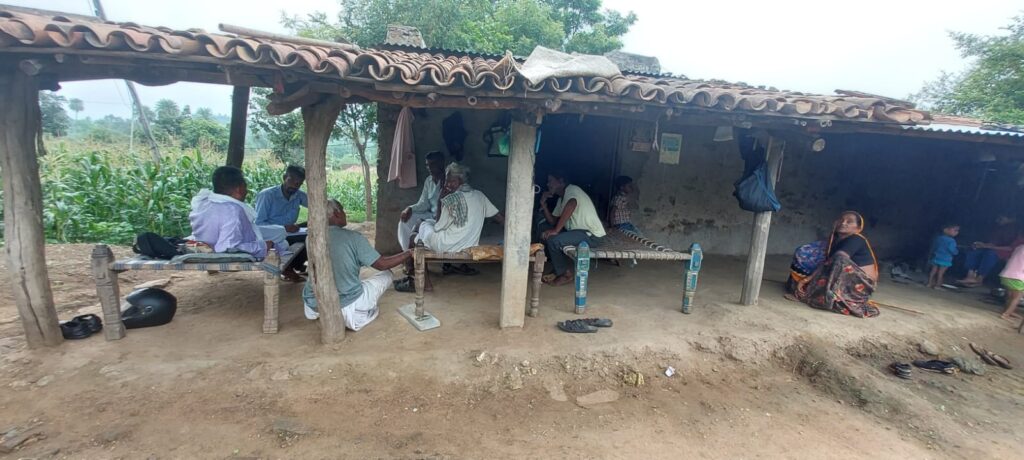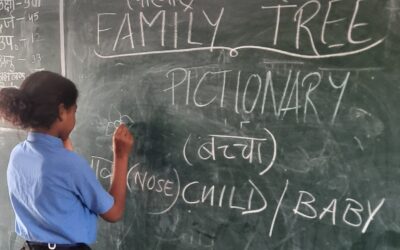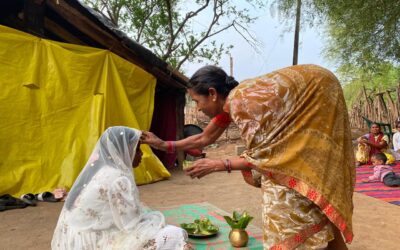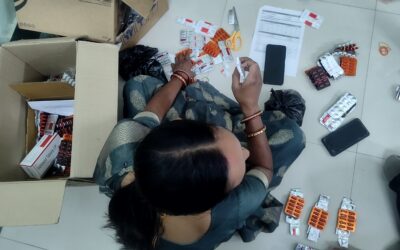“अरे, उन दिनों में हम ज्वार, बाजरा और माल की ही खेती करते थे, और जंगल में बाकी के अनाज ऐसे ही मिल जाते थे। और उन दिनों में हमें कभी भी बीमारी नहीं होती थी, हमारे गांव में बहुत से बुजुर्ग लोग कभी अस्पताल नहीं गए क्योंकि उनको जरूरत ही नहीं पड़ती थी…” – किशन लाल, उम्र 78 वर्ष
(In those days we used to cultivate only jowar, millet, and maize, and the rest of the grains were found in the forest. In those days we never got sick, and many elderly people in our village never went to the hospital because they did not need to. – Kishan Lal, 78 years )
I have been working in Kotda for over eight months. This place, the environment, and the people, all of it became joyful after the first encounter with local community. It has been terrific. During this time, I have been visiting villages in the Kotda block, meeting people, talking to them about their lives, and documenting it.
The purpose of the documentation is to preserve their vanishing indigenous culture. I started this by sitting with the elders of the community and talking to them about the “good old times“, as they call it. While talking to the elders, I have often caught them starting with, “arre, un dino mein toh…” and ending with, “…magar ab vo baat nahi rahi“.
Monsoon is a busy season for people living in Kotda because it’s agriculture time. There was the naive me who thought that I could meet the villagers and take their time during this busy period. Well, I did meet some of them, and we exchanged a few words but everyone was busy, either in their fields, with the cattle, with irrigation, or just a lot of housework. So, after a few failed attempts of getting them to sit and talk to me, I just joined them in whatever they were doing.
My curiosity and openness made them interested in me and they opened up as well. From then on, the conversations flowed easily with them. They would lead it while I followed and nodded along. They started telling me about the difference in farming over time, and also tested my farm knowledge by asking me questions about the agricultural practices in my hometown. Unsurprisingly, they knew about it more than me.

In one such conversation, Kewla Ram ji asked me if my family had farmlands and he was disappointed to know that we had none. But his follow-up questions were more surprising to me, “Kitne bhai behen ho aap?“, “Aapki umar kya hai?“, “Toh aapki shaadi ho gayi?” and “Kya padhte ho aap?” I remember him being astonished at my answers and quietly approving my lifestyle even though it is drastically different from that of his daughter who is my age as well. The most iconic statement from him was, “aap jaise log kam hote hain beta, poore dil se jiyo aur jo sahi lage wahi karo, kabhi bhi samaaj ki mat sochna…“
Talking about his life experiences, he seemed inclined towards the past when they used to farm and raise cattle. “We had a good lifestyle“, he said. By that, he meant that no one got sick, and they had two meals a day with loads of ghee and buttermilk. Moreover, he told me about several local remedies done by local bhopas (quacks) to cure fevers, snake bites, allergies, and throat infections. Most of them included a specific leaf, or flower used as medicine. Some also included a massage technique to get relief.
Keli Bai, 65, told me about marriages in those days while we both sat by the chulha during lunchtime. “मेरी शादी में लोग बहुत दूर से पैदल ही आए थे। और हमारे समय में ढोल और शहनाईयाँ होती थीं, ये डीजे-स्पीकर नहीं।” (People had come to my wedding on foot from afar. And in those times, there were drums and shehnai, not all these DJ-speakers.) She later proceeded to teach me how to make tea, her unique recipe.
She also told me about a local tradition called “Dhepa“. It simply means betrothal gifts given by the groom’s family to the bride’s family. “मेरी शादी 10 रुपये में ही हुई थी, मगर आजकल लड़कियों के परिवार में 50-50 हजार रुपये लिए बिना शादी को राज़ी नहीं होते,” she shook her head in disapproval. (I got married in just 10 rupees, but nowadays girls’ families do not agree to marry even with 50,000 rupees).

I also talked to some children during one of my visits to a nearby school. They were either playing kabaddi or cricket or lagori (seven stones). However, what caught my interest was a few kids who had glucose bottles tied with strings. They were dragging those empty bottles on the road.
After a while, some kids started to gather around me and we had some conversations about their schools, teachers, favorite subjects, games, and the mid-day meals. I asked them about their grandparents and they all replied in the same way, “मेरे दादा जी और दादी जी खेत पर काम करते हैं।” (My grandfather and grandmother work on the farm.) Some of them shared about their fun times with their grandparents, “हम सब साथ बैठ के पुराने गीत गाते हैं और साथ नाचते भी हैं।” ( We all sit together and sing old songs and dance together.) This brief interaction made me see a new window through which the previous generation passes their culture, history, and wisdom to the new ones.
People in Kotda have their own ways of keeping in touch with their culture and roots. For example, after a workshop on millet cultivation, the community has started to go back to growing maize and millets in a part of their fields where they usually grow BT Cotton or other cash crops. Also, locals still first reach out to their village heads called mukhiyas to resolve a dispute before going to the police.
And in all these stories, people I interact with feel nostalgic about the past. Their love and longing for the good old days seem evident while they understand that I am there to know them and document their culture. As soon as they see me looking for stories, and know the bigger picture, they feel connected. And, probably, it’s their urge to resurrect their culture that leads them to open up to me.




0 Comments